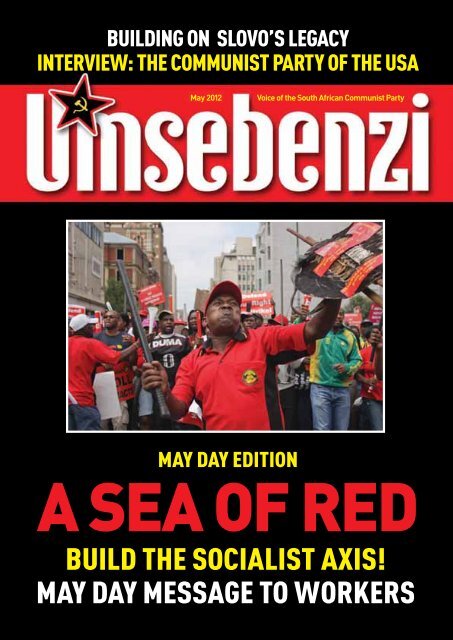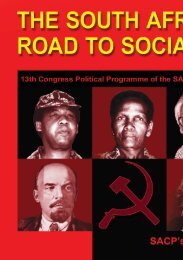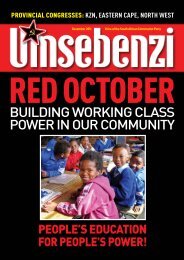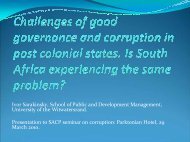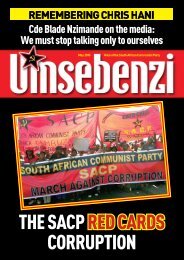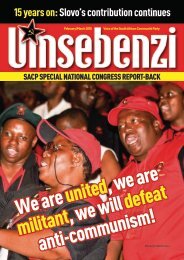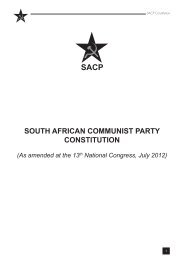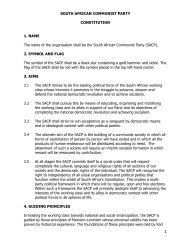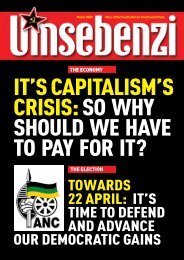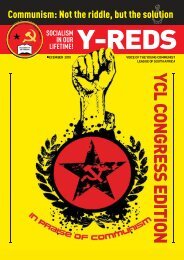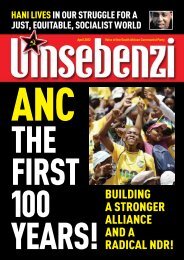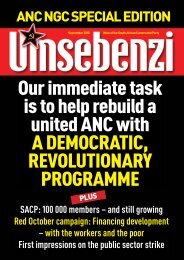A sea of red - South African Communist Party
A sea of red - South African Communist Party
A sea of red - South African Communist Party
Create successful ePaper yourself
Turn your PDF publications into a flip-book with our unique Google optimized e-Paper software.
BUILDING ON SLOVO’S LEGACY<br />
INTERVIEW: THE COMMUNIST PARTY OF THE USA<br />
May 2012<br />
Voice <strong>of</strong> the <strong>South</strong> <strong>African</strong> <strong>Communist</strong> <strong>Party</strong><br />
MAY DAY EDITION<br />
A SEA OF RED<br />
BUILD THE SOCIALIST AXIS!<br />
MAY DAY MESSAGE TO WORKERS
MAY DAY<br />
A <strong>sea</strong> <strong>of</strong> <strong>red</strong><br />
Workers’ role in our 100-year liberation struggle<br />
– and the need to see unity in action today!<br />
BY MFANAFUTHI TSELA<br />
May 2012<br />
Mfanafuthi Tsela<br />
Alliance unity in action at the national May Day rally: ANC Free State chair Cde Ace<br />
Magashule, SACP General Secretary Cde Blade Nzimande, <strong>South</strong> <strong>African</strong> and ANC<br />
President Cde Jacob Zuma and Cosatu President Cde S’dumo Dlamini<br />
The theme <strong>of</strong> this year’s May<br />
Day’s celebrations was “Celebrating<br />
workers’ contribution<br />
to the struggle for liberation”.<br />
Fifteen rallies were organised in the<br />
country. The main May Day rally was<br />
in Botshabelo Stadium in Mangaung,<br />
addressed by ANC President Cde Jacob<br />
Zuma, Cosatu President Cde S’dumo<br />
Dlamini and SACP General Secretary<br />
Cde Blade Nzimande. The rally was well<br />
attended and workers’ spirits were high,<br />
with a <strong>sea</strong> <strong>of</strong> <strong>red</strong> caps and T-shirts.<br />
Another high pr<strong>of</strong>ile rally, at Sisa<br />
Dukashe Stadium, East London, was<br />
addressed by Cosatu’s General Secretary<br />
Cde Zwelinzima Vavi, the ANC’s<br />
Secretary General Cde Gwede Mantashe<br />
and the SACP’s Deputy Secretary General<br />
Cde Jeremy Cronin.<br />
In his speech, Cde Blade Nzimande<br />
lauded the organised<br />
labour movement in <strong>South</strong><br />
Africa, led by Cosatu “for demonstrating<br />
its massive power,<br />
its capacity to impact dramatically<br />
and decisively on key social<br />
issues that affect the workers<br />
and poor <strong>of</strong> our country.”<br />
He also praised Cosatu,<br />
the ANC, and government for<br />
seeking a united way out <strong>of</strong> the e-tolling<br />
crisis. These developments follow<br />
the massive demonstration <strong>of</strong> worker<br />
power in the general strike <strong>of</strong> 7 March.<br />
“The SACP marched shoulder-toshoulder<br />
with Cosatu and its affiliates<br />
to express our sha<strong>red</strong> concerns about<br />
the Gauteng Freeway Improvement<br />
Project, and our sha<strong>red</strong> hat<strong>red</strong> <strong>of</strong> the<br />
role played by labour-brokers, these<br />
modern day slave-traders.”<br />
But Cde Nzimande warned that the<br />
postponement <strong>of</strong> e-tolling is not a solution,<br />
even though it provides an opportunity<br />
for the Tripartite Alliance<br />
to find a united way forward. “It<br />
is absolutely essential that we<br />
now unite – otherwise we will<br />
abandon this issue to the DA,<br />
AfriForum, the Automobile Association<br />
and other essentially<br />
right-wing, middle class interest<br />
groups.”<br />
He said Cosatu and the<br />
<strong>Party</strong>’s objections to the e-toll<br />
freeway project should not be confused<br />
with the objection <strong>of</strong> the DA, AfriForum,<br />
or the car-hire companies. “These<br />
‘Workers have been<br />
key in defining the<br />
parameters and content<br />
<strong>of</strong> the SA struggle’<br />
freeways are basically an infrastructure<br />
used and enjoyed by an overwhelming<br />
majority <strong>of</strong> middle and upper-middle<br />
income earners. The DA and its friends<br />
are not objecting to the fact that R20-<br />
billion <strong>of</strong> our scarce public resources<br />
have been spent on their Gauteng infrastructure.<br />
They don’t want to pay<br />
themselves.”<br />
He called for an investigation into<br />
the e-tolling project and lambasted bureaucrats<br />
in the National Treasury for<br />
defending the project. “The idea <strong>of</strong> a<br />
multi-billion freeway system in Gauteng<br />
was first pushed by a group <strong>of</strong> former<br />
ANC Gauteng politicians, in league with<br />
narrow BEE entrepreneurs and big capital<br />
– both locally and internationally.”<br />
He said most <strong>of</strong> the former ANC Gauteng<br />
leaders involved in these projects<br />
were part and parcel <strong>of</strong> the 1996 class<br />
project; some <strong>of</strong> them went on to join<br />
Cope. The General Secretary noted that<br />
the Gautrain does not go anywhere near<br />
the major townships <strong>of</strong> Gauteng.
Marching in Johannesburg against labour broking and e-tolling<br />
At Sisa Dukashe, Cde Cronin said<br />
the Alliance needs to consider the impact<br />
the tolls would have on the working<br />
class. “Infrastructure must be improved<br />
for ordinary people, and not<br />
only for improving the lives <strong>of</strong> the middle<br />
and upper classes.”<br />
He also called for the alliance to fight<br />
for a “fair economic wage for the working<br />
class”. Cde Cronin said the SACP<br />
and Cosatu will always be united in opposing<br />
corruption in government.<br />
Cosatu’s Cde Dlamini dismissed reports<br />
<strong>of</strong> deepening rifts within the alliance<br />
ahead <strong>of</strong> the ANC elective conference<br />
in Mangaung in December. He<br />
said that there was no animosity between<br />
the SACP and Cosatu, and that<br />
Cosatu and the SACP are not ganging<br />
up against the ANC.<br />
Cde Vavi paid tribute to Cdes John<br />
Gomomo, Oscar Mpetha, Moses Mabhida,<br />
Thozamile Gqweta and many other<br />
worker leaders who struggled against<br />
capitalism and apartheid colonialism.<br />
He said that Cosatu, together with the<br />
ANC and the SACP, will continue to<br />
push for a progressive agenda.<br />
He also reiterated Cosatu’s position<br />
on the outright banning <strong>of</strong> labour<br />
brokers.<br />
He stressed that the “labour market<br />
in <strong>South</strong> Africa is sufficiently flexible if<br />
not too flexible. If you judge that by the<br />
fact that, we lost over one million jobs<br />
between 2008 and 2009, and employers<br />
did that without any sweat.”<br />
Paying tribute to the contribution<br />
<strong>of</strong> <strong>South</strong> <strong>African</strong> workers in the struggle<br />
for liberation, ANC President Cde<br />
Jacob Zuma said “workers have distinguished<br />
themselves within the 100<br />
years <strong>of</strong> the existence <strong>of</strong> the ANC as a<br />
significant partner in the struggle for<br />
the liberation and development. Their<br />
progressive and revolutionary outlook<br />
has been key in defining the parameters<br />
and content <strong>of</strong> our struggle.”<br />
He said stalwart worker leaders such<br />
as Cdes Clements Kadalie, Vuyisile<br />
Mini, Elijah Barayi and Chris Dlamini<br />
were among the most advanced <strong>of</strong> our<br />
revolutionaries owing to their understanding<br />
<strong>of</strong> the interdependence <strong>of</strong> the<br />
struggle <strong>of</strong> the workers and those <strong>of</strong> our<br />
communities.<br />
Cde Mantashe urged workers to<br />
Deepen the Cosatu-SACP<br />
axis – as part<br />
<strong>of</strong> deepening the unity<br />
<strong>of</strong> our Alliance<br />
play a role in the ANC’s centenary celebrations.<br />
“Workers should claim their<br />
space in these celebrations because<br />
they are not for the ANC only, but for<br />
the entire workforce.”<br />
Speaking in the May Day Rally in<br />
Alexandra, Johannesburg, ANC Deputy<br />
Secretary General Cde Thandi Modise,<br />
said many <strong>of</strong> the ANC’s outstanding<br />
leaders came from Cosatu. These include<br />
Cosatu’s founding President Cde<br />
Elijah Barayi, who was an ANC underground<br />
operative. This rally received<br />
a message <strong>of</strong> support from Cde Jerry<br />
Thibedi on behalf <strong>of</strong> the SACP, with<br />
the keynote address by Cde Bheki Ntshalintshali,<br />
Deputy General Secretary<br />
<strong>of</strong> Cosatu.<br />
Other May Day rallies were held in<br />
Witbank and Bushbuckridge (Mpumalanga),<br />
Thohoyandou and Lebowakgomo<br />
(Limpopo), Kuruman (Northern<br />
Cape), Ulundi and Ladysmith (Kwazulu-Natal),<br />
Cape Town, Plettenburg<br />
Bay and Saldanha Bay (Western Cape),<br />
and Moses Kotane Municipality (North<br />
West).<br />
Throughout the country, the messages<br />
<strong>of</strong> unity within the Alliance and<br />
the need to consolidate and take forward<br />
workers’ struggles came though<br />
clearly.<br />
<br />
Cde Tsela is an SACP activist<br />
May 2012
MAY DAY<br />
Build the socialist axis<br />
<strong>of</strong> the SACP and Cosatu<br />
Tasks <strong>of</strong> the trade union movement in the current period<br />
– the May Day 2012 SACP message to workers<br />
Over the past weeks, the organised<br />
labour movement, led by<br />
Cosatu, has once more demonstrated<br />
its massive power,<br />
its capacity to impact dramatically and<br />
decisively on key social issues that affect<br />
the workers and poor <strong>of</strong> our country.<br />
The SACP salutes Cosatu, the ANC,<br />
and government for seeking a united<br />
way out <strong>of</strong> the crisis that has been provoked<br />
by the e-Toll project in Gauteng.<br />
The announcement followed the massive<br />
demonstration <strong>of</strong> worker power in<br />
the general strike <strong>of</strong> 7 March. On that day<br />
the SACP marched shoulder-to-shoulder<br />
with Cosatu. Of course, we must remember<br />
that a postponement <strong>of</strong> e-tolling is<br />
exactly that – just a postponement.<br />
Following the court judgment, that<br />
postponement will now have been<br />
considerably more than one month.<br />
The delay gives us some more space as<br />
the Tripartite Alliance to find a united<br />
way forward. It is absolutely essential<br />
that we do now unite ourselves.<br />
So how do we move forward together to<br />
provide progressive leadership on the e-<br />
Toll crisis?<br />
Let’s first remind ourselves about<br />
the background to the e-Toll crisis. The<br />
idea <strong>of</strong> a multi-billion rand widening<br />
and expanding <strong>of</strong> the freeway system<br />
in Gauteng was first pushed in the early<br />
2000s by a group <strong>of</strong> former ANC Gauteng<br />
politicians. They were in league with narrow<br />
BEE entrepreneurs, and big capital<br />
– both local and foreign. It was basically<br />
the same group who also pushed for<br />
the multi-billion-rand Gautrain project.<br />
Most <strong>of</strong> the former ANC Gauteng leaders<br />
involved in these projects were part and<br />
parcel <strong>of</strong> the 1996 class project; some <strong>of</strong><br />
them went on to join Cope.<br />
Neither the Gautrain nor the Freeway<br />
May 2012<br />
Marching shoulder-to-shoulder: the Johannesburg march against e-tolling and<br />
labour broking<br />
Project was concerned with addressing<br />
the transport problems confronting the<br />
working class and poor in Gauteng. They<br />
were projects essentially directed at making<br />
pr<strong>of</strong>its at public expense, meeting<br />
the needs <strong>of</strong> upper and middle-income<br />
The ‘user-pays’ approach<br />
will <strong>red</strong>istribute<br />
resources from the poor<br />
to the rich – instead <strong>of</strong><br />
the other way around<br />
earners in Gauteng.<br />
The Gautrain, which cost R27-billion,<br />
and which is still costing the Gauteng province<br />
some R300-million a year in ridership<br />
guarantees, doesn’t go anywhere near<br />
any <strong>of</strong> the major townships <strong>of</strong> Gauteng.<br />
With the R27-billion plus we have spent<br />
on the Gautrain we could, instead, have<br />
made a huge impact on improving bus<br />
services, Metrorail services, and township<br />
and rural access roads throughout<br />
<strong>South</strong> Africa. And we could have created<br />
local jobs, instead <strong>of</strong> jobs in the UK.<br />
It was essentially the same group <strong>of</strong><br />
tenderpreneurs who championed the<br />
Gautrain project who also championed<br />
the Gauteng e-Toll project. And once<br />
again the patterns are the same. In fact,
A <strong>sea</strong> <strong>of</strong> <strong>red</strong>: part <strong>of</strong> the 100 000-strong march through Johannesburg<br />
in a recent count by the Department <strong>of</strong><br />
Transport, it was found that only 2% <strong>of</strong><br />
the vehicles on the e-Toll roads are buses<br />
and minibuses. So these freeways are basically<br />
used by trucks and especially by<br />
private cars.<br />
Even in Gauteng – the richest province<br />
by far – almost 70%<br />
<strong>of</strong> households don’t have<br />
any access to a car. These<br />
households are reliant on<br />
public transport. And we<br />
all know that very <strong>of</strong>ten<br />
our current public transport<br />
is not reliable, it is <strong>of</strong>ten<br />
not safe, and on weekends<br />
or for a late shift it is<br />
<strong>of</strong>ten non-existent.<br />
There are therefore many lessons we<br />
need to learn from this crisis:<br />
Never again must we spend billions<br />
<strong>of</strong> rands on an infrastructure programme<br />
without first determining how it contributes<br />
to our key developmental priorities<br />
– jobs, overcoming inequality and<br />
poverty.<br />
Some bureaucrats in Treasury are defending<br />
the e-Toll project because they<br />
want to apply the “user-pay” principle<br />
to the delivery <strong>of</strong> all infrastructure. If at<br />
public expense we provide a rail-line for<br />
a big mining house, then the user must<br />
pay. If we supply scarce electricity to an<br />
aluminium smelter plant that uses more<br />
electricity than the whole <strong>of</strong> the Nelson<br />
Mandela Bay Metro, and which hardly<br />
creates any jobs in SA, then, again, the<br />
user should pay, and it should pay the full<br />
cost. But when we roll-out infrastructure<br />
that is used by a wide range <strong>of</strong> people,<br />
in a country with inc<strong>red</strong>ibly high levels<br />
<strong>of</strong> inequality and poverty, then the userpay<br />
principle is likely to increase the <strong>red</strong>istribution<br />
<strong>of</strong> resources from the poor<br />
to the rich, rather than the other way<br />
around. Moreover, the danger with exaggerating<br />
the “user-pay”<br />
principle for infrastructure<br />
is that it is liable to deflect<br />
us into projects where government<br />
calculates that<br />
there are many users who<br />
can pay – to the detriment<br />
<strong>of</strong> many other infrastructure<br />
needs in rural areas, in<br />
townships, in poorer provinces,<br />
where the possibility<br />
<strong>of</strong> extracting tolls or other levies is much<br />
less.<br />
We have weakened the power <strong>of</strong><br />
elected politicians in favour <strong>of</strong> hund<strong>red</strong>s<br />
<strong>of</strong> quasi-public stand-alone agencies, like<br />
Sanral. As emerged from the court case,<br />
Sanral has deliberately suppressed many<br />
<strong>of</strong> the key facts about the project. They<br />
blacked out key facts in the documents<br />
they handed over to Cosatu. But Sanral<br />
Opposition to capitalism<br />
is our duty – opposition<br />
to anti-worker<br />
tendencies in our<br />
government is essential<br />
even held back information from the<br />
Minister <strong>of</strong> Transport himself. When you<br />
weaken the state through agencification<br />
into hund<strong>red</strong>s <strong>of</strong> “corporate” agencies<br />
with their own boards and CEOs, you are<br />
also weakening democracy, and the power<br />
<strong>of</strong> the ruling Alliance and its ability to<br />
mandate and monitor the state.<br />
So how do we go forward?<br />
We may have to pay for the R20-billion<br />
debt directly from the budget. But<br />
that will mean taking R20-billion away<br />
from other critical priorities not just in<br />
Gauteng – but in the whole <strong>of</strong> <strong>South</strong> Africa.<br />
Already, the R5,8-billion fiscal contribution<br />
to the e-Toll debt was R5,8-billion<br />
taken away from infrastructure roll-overs<br />
in other provinces.<br />
We may have to increase the fuellevy<br />
for the purpose <strong>of</strong> paying this R20-<br />
billion. That means that minibus drivers<br />
in Lusikisiki, or Galeshewe, or Mitchell’s<br />
Plain, will be paying for freeways in the<br />
Gauteng that they will never use.<br />
Or we might impose an extra Gauteng<br />
fuel levy, but that will mean the rich and<br />
poor in Gauteng will have to pay, and<br />
it will mean that the many Gautengers<br />
who do not use these freeways will also<br />
be charged.<br />
We can’t just default on the debt, for<br />
several reasons, amongst which is the<br />
fact that much <strong>of</strong> the debt is held by the<br />
PIC, using the Government Employees’<br />
Pension Fund, in other words the pensions<br />
<strong>of</strong> hund<strong>red</strong>s <strong>of</strong> thousands <strong>of</strong> Cosatu<br />
public sector workers are at stake.<br />
The SACP says there must be an investigation<br />
into how we find ourselves<br />
May 2012
in this situation today so that such a<br />
mistake is never repeated. However, the<br />
bitter fact is that we are sitting with a<br />
R20-billion public sector debt. As Lenin<br />
said several times: In politics mistakes<br />
are made – that is inevitable. The point<br />
is to correct them as timeously as possible,<br />
and, above all, to look the mistake<br />
straight in the eye, to admit the mistake,<br />
and to learn lessons from it, so you don’t<br />
ever repeat it.<br />
We are right to oppose and campaign<br />
against corruption, against labour brokers,<br />
against wrong spending on wrong<br />
infrastructure priorities.<br />
But we also need to remember that<br />
Cosatu and the SACP are part <strong>of</strong> a ruling<br />
alliance. Neither <strong>of</strong> us are the ruling<br />
party as such, but we must surely share<br />
some <strong>of</strong> the responsibilities <strong>of</strong> governance<br />
– whether or not we happen to be<br />
deployed in government, whether or not<br />
we are working in the public sector.<br />
Opposition to capitalism is our duty.<br />
Opposition to the impact <strong>of</strong> capitalist<br />
interests and opposition to anti-worker<br />
influences on our government are absolutely<br />
essential.<br />
But <strong>of</strong> course, neither Cosatu nor the<br />
SACP are “the opposition”. We are not<br />
the DA, or Cope, or the FF+. Our pr<strong>of</strong>ession<br />
is not opposition for its own sake.<br />
Nor are we the leaders <strong>of</strong> some nebulous<br />
neo-liberal idea <strong>of</strong> “civil society” – we are<br />
unapologetically socialist and workingclass<br />
formations in an alliance with the<br />
ANC and premised on a far-reaching national<br />
democratic revolutionary struggle<br />
based on the pro-worker and pro-poor<br />
ideals <strong>of</strong> the Freedom Charter.<br />
And that means that in addition to<br />
opposing things that are anti-worker and<br />
anti-poor, we must also together with the<br />
ANC take responsibility for advancing<br />
positive policies for progressive transformation.<br />
Opposition is sometimes the<br />
easy part; constructive transformation is<br />
<strong>of</strong>ten the harder part.<br />
In fighting for affordable public transport<br />
and public infrastructure, we dare<br />
not make the mistake <strong>of</strong> only focusing<br />
on these matters in relation to one province.<br />
We must focus on infrastructure investment<br />
into all <strong>of</strong> <strong>South</strong> Africa, not just<br />
Gauteng. This is one <strong>of</strong> the most critical<br />
tasks <strong>of</strong> the working class in the current<br />
period.<br />
May 2012<br />
Marching against labour brokers – modern-day slave-owners<br />
Working class mobilisation for investment<br />
into public infrastructure<br />
It is <strong>of</strong> utmost importance that the<br />
working class takes a lead in driving the<br />
massive infrastructure investments announced<br />
by the President. Part <strong>of</strong> this<br />
struggle is to ensure that workers pension<br />
and provident funds are invested<br />
into infrastructure that will create jobs<br />
and improve the conditions <strong>of</strong> the workers<br />
and the poor.<br />
We, once again, call upon Cosatu to<br />
join the SACP in taking up the financial<br />
sector campaign, so that workers’<br />
funds are invested in a manner that<br />
will transform our society and support<br />
government’s priorities, including investment<br />
into productive activities and<br />
infrastructure.<br />
The SACP reiterates that too much <strong>of</strong><br />
the money in the hands <strong>of</strong> the financial<br />
sector is being invested into elite projects<br />
and investments into consumption<br />
rather than productive activity. The rise<br />
in unsecu<strong>red</strong> debts is a serious matter,<br />
and shows the reckless lending that still<br />
characterises the financial sector. Workers<br />
must address this through their organised<br />
power.<br />
The SACP calls on Cosatu<br />
to join our campaign<br />
to transform<br />
SA’s financial sector<br />
Defend and strengthen workers’ gains and<br />
organisation in the workplace<br />
Among the most critical challenges facing<br />
the trade union movement today<br />
are casualisation and outsourcing. The<br />
struggle against labour brokers must<br />
not only be fought through once-<strong>of</strong>f<br />
national strikes, but t daily in our various<br />
workplaces. Workers in their various<br />
workplaces know who is hi<strong>red</strong> through<br />
labour brokers. It is ultimately in these<br />
workplace struggles that we will defeat<br />
the modern-day slave owners.<br />
The SACP calls upon, and pledges to<br />
work with, the trade union movement in<br />
strengthening shop-floor organisation.<br />
One <strong>of</strong> the consequences <strong>of</strong> increasing<br />
casualisation has been an ever-growing<br />
army <strong>of</strong> vulnerable workers, thus leading<br />
to the weakening <strong>of</strong> a number <strong>of</strong> Cosatu<br />
affiliates.<br />
The SACP calls upon both communists<br />
and worker leaders to use this May<br />
Day to focus on the organisation <strong>of</strong> vulnerable<br />
workers and to strengthen the<br />
weaker affiliates.<br />
Part <strong>of</strong> strengthening trade union<br />
organisation must be to intensify the<br />
struggle against corruption. We must<br />
intensify the struggle against business<br />
unionism – the use <strong>of</strong> one’s position in<br />
the trade union movement to advance<br />
private business interests. Whilst unions<br />
are workers’ organs to defend their interests,<br />
to the capitalists they are a source <strong>of</strong><br />
business because <strong>of</strong> the pension, provident<br />
and insurance funds in their hands.<br />
It is for this reason that sections <strong>of</strong> business<br />
will seek to corrupt worker leaders<br />
in order to grab these billions. Let us<br />
therefore intensify the struggle against<br />
business unionism!
Intensify the struggle for a decent social<br />
wage<br />
The SACP agrees with Cosatu that, increasingly,<br />
we must unite our alliance in<br />
action and in campaigning around what<br />
we call social wage issues. Of course, a<br />
trade union movement will always have<br />
as its bread-and-butter concern the economic<br />
wages <strong>of</strong> workers. But as long as<br />
we confine our attention to the economic<br />
wage, to the pay packet, we will remain<br />
trapped within the exploitative confines<br />
<strong>of</strong> capitalism. We will continue to treat<br />
workers as commodities struggling for a<br />
so-called “fair price” for labour.<br />
But workers are human beings, with<br />
a wide range <strong>of</strong> social needs. Employed<br />
workers, under-employed workers and<br />
the mass <strong>of</strong> unemployed can be best<br />
be united around issues <strong>of</strong> common<br />
concern:<br />
Decent education and training opportunities<br />
for all, especially for working<br />
class families.<br />
Housing that is well located, affordable,<br />
and part <strong>of</strong> building communities<br />
with amenities, with parks and sports<br />
facilities. No more dormitory townships.<br />
Away with rows and rows <strong>of</strong> houses built<br />
miles away from work. Let us put pressure<br />
on the banks to fund affordable<br />
housing for those stranded in the gap<br />
Doing our<br />
duty to<br />
oppose<br />
wrong<br />
spending<br />
on wrong<br />
infrastructure<br />
priorities<br />
housing market – who do not qualify for<br />
RDP houses, and who are nonetheless<br />
turned away by the banks.<br />
Let us together campaign for decent,<br />
affordable and safe public transport.<br />
We will never have effective and affordable<br />
transport for the working class if<br />
townships continue to be built far away.<br />
If we continue to let property speculators<br />
and the private banks dominate our land<br />
use policies, and we allow corrupt politicians<br />
to sell <strong>of</strong>f well-located land to these<br />
speculators.<br />
Let us struggle for active land reform<br />
– both in the rural areas to ensure sustainable<br />
livelihoods – and in urban areas,<br />
so that the cost <strong>of</strong> land and <strong>of</strong> affordable<br />
housing isn’t gambled away by the<br />
private speculators building more golf<br />
estates and shopping malls for the rich.<br />
Let us refuse to be pulled into factional<br />
battles that the media continuously<br />
seeks to foment within our ranks.<br />
Factional battles around personalities<br />
divide our formations from within; they<br />
run the risk <strong>of</strong> dividing our alliance. Over<br />
the past 18 years the critical Cosatu-SACP<br />
axis has been especially important. It<br />
was the Cosatu-SACP axis that helped<br />
to rescue the ANC from the grip <strong>of</strong> the<br />
neo-liberal “1996 class project”. It is the<br />
Cosatu-SACP socialist axis that must<br />
help our key alliance partner, the ANC,<br />
to focus on the key struggles <strong>of</strong> our time.<br />
In a world in which capitalism remains<br />
dominant, however deep its crisis, in a<br />
country in which the capitalist class, and<br />
particularly huge monopoly capital interests,<br />
are deeply entrenched, a socialist<br />
axis is absolutely critical. Without a coherent,<br />
well organised, active Cosatu and<br />
SACP – the National Democratic Revolution<br />
will be betrayed and lost.<br />
Let us re-commit ourselves during<br />
this 2012 May Day to deepen the relationship<br />
between Cosatu and the SACP,<br />
as part <strong>of</strong> deepening the unity <strong>of</strong> our Alliance!<br />
<br />
The May Day massacre no-one remembers<br />
This excerpt is from<br />
Govan Mbeki, The<br />
Struggle for Liberation<br />
in <strong>South</strong> Africa, 1992<br />
1 May 1950<br />
Eighteen workers were killed<br />
along the Witwatersrand on<br />
that day by the apartheid<br />
regime, according to Govan Mbeki,<br />
writing in 1992.<br />
M P Naicker, national spokesperson<br />
<strong>of</strong> the ANC and editor <strong>of</strong> Sechaba,<br />
writing in 1976, recorded the number<br />
<strong>of</strong> dead May Day Reef “freedom strikers”<br />
as 16.<br />
Michael Harmel, writing for the<br />
<strong>Party</strong>’s fiftieth anniversary, records<br />
the number as 18.<br />
Govan Mbeki<br />
Of names, today we have none.<br />
That re<strong>sea</strong>rch remains to be done.<br />
Maybe they can be found in Guardian/New<br />
Age, for which both Mbeki<br />
and Naicker had worked before they<br />
had been sent to respectively Robben<br />
Island (Mbeki), and exiled (Naicker).<br />
What Mbeki and Naicker agree<br />
about is that this was the moment<br />
when the working class and the liberation<br />
movement came together in<br />
defence <strong>of</strong> the <strong>Communist</strong> <strong>Party</strong>, and<br />
faced the enemy unto death.<br />
This is very surprising since anticommunism<br />
was not completely<br />
absent from the ranks <strong>of</strong> the ANC at<br />
the time. And the <strong>Communist</strong> <strong>Party</strong><br />
<strong>of</strong> <strong>South</strong> Africa was about to cease to<br />
exist as a consequence <strong>of</strong> the Suppression<br />
<strong>of</strong> Communism Act.<br />
The memory <strong>of</strong> May Day 1950<br />
is a solemn one for <strong>South</strong> Africa’s<br />
communists.<br />
To know that lives were sacrificed<br />
in this way for the sake <strong>of</strong> our <strong>Party</strong>,<br />
at what might have been its loneliest<br />
moment, is unforgettable. The <strong>Party</strong>’s<br />
bond with the working class and with<br />
the liberation movement was consecrated<br />
on that day in a way that can<br />
never be reversed.<br />
The historic consequences for<br />
<strong>South</strong> Africa are as recorded by Govan<br />
Mbeki, in the excerpt reproduced<br />
below, which is followed by excerpts<br />
from Naicker and Harmel. <br />
May 2012
JOE SLOVO MEMORIAL<br />
Building on the<br />
legacy <strong>of</strong> Cde Joe<br />
This is an edited version <strong>of</strong> a speech given by Bheki Mvovo<br />
at the Joe Slovo Memorial in Khayelitsha<br />
As a Christian myself, I attend<br />
lectures every Sunday, where<br />
only one person speaks during<br />
preaching. But that person<br />
quotes from the same bible that everybody<br />
is reading.<br />
I am also going to speak the same<br />
politics that you know, but try to put it<br />
in a way that must inspire us moving<br />
forward.<br />
Cde Joe Slovo was born on 23 May<br />
1926 and died on 6 January 1995. At the<br />
time <strong>of</strong> his death he was SACP National<br />
Chairperson, a member <strong>of</strong> the ANC NEC<br />
and NWC, and Minister <strong>of</strong> Housing:<br />
A communist, negotiator, strategist,<br />
and tactician, Cde Slovo served in National<br />
Consultative Committee <strong>of</strong> the<br />
Congress Alliance leading up to the Congress<br />
<strong>of</strong> the People in 1955 where<br />
the Freedom Charter, which<br />
he contributed, was adopted.<br />
However, he could not attend<br />
but observed from a distance<br />
because <strong>of</strong> the restrictions imposed<br />
on him.<br />
We celebrate Cde Slovo as<br />
a reminder <strong>of</strong> his work to enhance<br />
our ongoing endeavours<br />
for the transformation <strong>of</strong> society<br />
by reflecting on his exemplary<br />
conduct. Like the symbolism <strong>of</strong> Christ in<br />
making wine for the hund<strong>red</strong>s at a wedding,<br />
by flavouring the revolution with<br />
Cde Slovo we are ensuring that after 50<br />
years <strong>of</strong> MK struggle, the people <strong>of</strong> <strong>South</strong><br />
Africa continue to remember and appreciate<br />
his role.<br />
Let me borrow from Lenin when he<br />
says “the role <strong>of</strong> a vanguard fighter can<br />
be fulfilled only by a party that is guided<br />
Bheki Mvovo<br />
Joe Slovo: we celebrate his life<br />
by the most advanced theory”. In <strong>South</strong><br />
<strong>African</strong> politics it is not difficult to find<br />
that party and also that the most advanced<br />
theory is there. Lenin continues<br />
to say that “it is not enough to be a revolutionary<br />
and an adherent <strong>of</strong> socialism<br />
or a <strong>Communist</strong> in general. You must be<br />
able at each particular moment to find<br />
the particular link in the chain<br />
which you must grasp with all<br />
your might to hold the whole<br />
chain and to prepare firmly for<br />
the transition to the next link<br />
...”<br />
We therefore need to develop<br />
an understanding <strong>of</strong> where<br />
we are as revolutionaries every<br />
time and re-examine our theory<br />
and build Marxism for our own<br />
contemporary conditions.<br />
We cannot treat the current political<br />
conjuncture as if we are spectators<br />
who are waiting for somebody to make<br />
a mistake and then say “we told you so”.<br />
But as the <strong>Party</strong>, we have made scientific<br />
analysis based on both historical and<br />
dialectic materialism and our contribution<br />
and desire for the implementation<br />
<strong>of</strong> the Reconstruction and Development<br />
Programme (RDP) which is based on<br />
the need for the radical socio-economic<br />
transformation <strong>of</strong> <strong>South</strong> Africa.<br />
The CPSA’s Black Republic Thesis <strong>of</strong><br />
1928 and Cde Joe Slovo’s <strong>South</strong> Africa: No<br />
middle ground in 1978 provided clear confirmation<br />
from the <strong>Party</strong> that we could<br />
not wait for the ANC to hoist the black,<br />
green and gold flag in <strong>South</strong> Africa before<br />
resuming the struggle for socialism.<br />
These policy positions were identifying<br />
the National Democratic Revolution<br />
(NDR) as the direct route to socialism.<br />
This meant that as the <strong>Party</strong> we had to<br />
raise the importance <strong>of</strong> the struggle for<br />
national liberation whilst at the same<br />
time raising the importance <strong>of</strong> the class<br />
struggle.<br />
The issue <strong>of</strong> the two stage theory has<br />
never been the <strong>Party</strong>’s agenda but an<br />
antithesis <strong>of</strong> the dialectic materialism <strong>of</strong><br />
the SACP. The NDR is about the emancipation<br />
<strong>of</strong> the black people in general<br />
and <strong>African</strong> people in particular while<br />
addressing the three interrelated contradictions<br />
<strong>of</strong> national, gender and class.<br />
They are interrelated because when<br />
addressing the National Question you<br />
must ask yourself, what is the gender and<br />
class component <strong>of</strong> what you are trying<br />
to address and vice versa. That is how the<br />
transformation <strong>of</strong> our society will be possible.<br />
For example the significant advances<br />
that have been made by the Department<br />
<strong>of</strong> Higher Education and Training were<br />
because <strong>of</strong> sticking to basics. Even the<br />
proposals <strong>of</strong> the NHI and programmess<br />
by the Minister <strong>of</strong> Health make so much<br />
sense because <strong>of</strong> those basics.<br />
We do not celebrate or raise the name<br />
<strong>of</strong> the dead in order to persecute the living,<br />
hence we appreciate the work that<br />
May 2012
Cde Joe: the people remember his role<br />
the current leadership <strong>of</strong> the <strong>Party</strong> is doing<br />
taking from the work that was done<br />
by past leaders. The SACP is not an NGO<br />
but a Marxist Leninist party whose struggles<br />
are found in all terrains. That is why<br />
Cde Slovo was a Minister in the Mandela<br />
Administration in 1994.<br />
The significance <strong>of</strong> 1994<br />
The 1994 ANC election victory significantly<br />
alte<strong>red</strong> the balance <strong>of</strong> forces in<br />
the country. But the biggest problem<br />
was the conceptualisation <strong>of</strong> that period<br />
by the ANC. This was reflected in Mayibuye<br />
which presented the situation as<br />
the culmination <strong>of</strong> decades and even <strong>of</strong><br />
centuries <strong>of</strong> struggle, as it is the moment,<br />
liberation, the real change. The <strong>Party</strong> admitted<br />
that “elections alte<strong>red</strong> the balance<br />
<strong>of</strong> forces, however the balance <strong>of</strong> forces<br />
remained complex: the security forces,<br />
the civil service, control and ownership<br />
<strong>of</strong> the economy, the media, the judiciary,<br />
in all these areas we are inheriting a white<br />
minority and capitalist legacy. Protracted<br />
transformation struggles lie ahead, and<br />
clearly such transformation requires effective<br />
use <strong>of</strong> our new positions with our<br />
traditional power base – our mass and<br />
community-based structures”.<br />
War was waged against the revolution<br />
after the 1994 breakthrough with<br />
the ANC’s election victory by liberals<br />
inside and outside our movement. The<br />
RDP was the first victim. The attack on<br />
the RDP was the initial attack on the Alliance<br />
as the strategic centre because it<br />
was a programme <strong>of</strong> the Alliance. Cde<br />
Nelson Mandela in his first post-election<br />
interview with the Sunday Times, said<br />
the RDP document contains not a word<br />
about nationalisation though the document<br />
mentions the need for “increasing<br />
the public sector in strategic areas”<br />
through, for example, nationalisation.<br />
And the <strong>Party</strong> has been calling for Mittal<br />
Steel and Sasol to be nationalised in line<br />
with that.<br />
The then Minister <strong>of</strong> Labour, Cde<br />
Tito Mboweni, decla<strong>red</strong> triumphantly<br />
to The Economist that minimum wages<br />
and nationalisation are not mentioned<br />
in the RDP (wrong in both counts). The<br />
RDP was hijacked by conservative politicians<br />
such as the NNP’s Hernus Kriel and<br />
the IFP’s Frank Mdlalose who said that<br />
they were ready to implement the RDP.<br />
The soul <strong>of</strong> the RDP had been removed<br />
and it was liberalised. The people were<br />
stripped <strong>of</strong> their participation in their<br />
own development.<br />
The transformation <strong>of</strong> security forces<br />
remains a problem hence we find situations<br />
like the Andries Tatane incident.<br />
The judiciary is used by those who have<br />
failed to get a political mandate through<br />
elections and the civil service is providing<br />
third class service to the working<br />
class. Without overemphasising the importance<br />
<strong>of</strong> the transformation <strong>of</strong> the security<br />
forces, the word revolution means<br />
an act <strong>of</strong> force. As the working class we<br />
are just wasting our time if we think we<br />
can achieve revolution when we do not<br />
have security forces on our side.<br />
Sovereignty <strong>of</strong> nations<br />
What makes the current conjuncture<br />
extremely difficult is the unipolar world<br />
that has made our struggles for self-determination<br />
and sovereignty impossible.<br />
No country in the world can claim sovereignty<br />
today except the US.<br />
The so-called protests in the Arab world<br />
where leaders like Muammar Gadaffi are<br />
killed like dogs and buried are examples.<br />
Another example is when the US undermined<br />
the sovereignty <strong>of</strong> Pakistan,<br />
in assassinating Osama Bin Laden. And<br />
in case our security forces are still controlled<br />
by the former apartheid <strong>of</strong>ficers.<br />
What is the future for the NDR?<br />
As a result our government tries to<br />
deal will this by introducing laws such<br />
as The Protection <strong>of</strong> State Information Bill.<br />
It is imperative the masses <strong>of</strong> our people<br />
are mobilised to own this piece <strong>of</strong> legislation.<br />
The masses overwhelmingly vote<br />
the ANC because they have confidence<br />
in it.<br />
The Medium Term Vision (MTV)<br />
gives us an overall direction on where<br />
we need to put our efforts to hegemonise<br />
the working class. Only when the working<br />
class is hegemonic can we say we<br />
have attained socialism.<br />
At the same time we have to make<br />
advances within the current bourgeoisie<br />
epoch by making some advances for<br />
the working class such as in provision <strong>of</strong><br />
running water, electricity, housing, free<br />
education and access to food. These are<br />
the basic necessities that nobody should<br />
go without. .<br />
The MTV is about hegemonising the<br />
working class in the communities, economy,<br />
workplace, international sphere<br />
and most, importantly, in the ideological<br />
front. The MTV seeks to put our mass<br />
base and the working class in the driving<br />
<strong>sea</strong>t <strong>of</strong> the developmental agenda.<br />
The SACP has decla<strong>red</strong> year 2012 as<br />
the year <strong>of</strong> building working class power<br />
for a solidarity economy. Our Programme<br />
<strong>of</strong> Action then focuses on increasing<br />
communist activism on the education<br />
front by improving the functionality <strong>of</strong><br />
our schools and with intensified focus on<br />
skills development, especially the skilling<br />
<strong>of</strong> the working class.<br />
We have a task to engage all our communities,<br />
teachers, school governing bodies,<br />
pupils and government to improve<br />
the quality <strong>of</strong> education in our country<br />
and also pay more attention to closing<br />
the infrastructure gap in our education<br />
system and the ideological orientation <strong>of</strong><br />
our curricula.<br />
<br />
Cde Mvovo is a SACP Western Cape<br />
member and President <strong>of</strong> Sasfu<br />
May 2012
ANC<br />
Respect and discipline<br />
– the obligations<br />
<strong>of</strong> every member<br />
Apson Sepadi Makaung argues that the revolutionary<br />
discipline demanded by Cde Oliver Tambo is vital in<br />
the run-up to the ANC’s Mangaung National Conference<br />
The <strong>African</strong> National Congress<br />
practices democratic centralism.<br />
It also advocates discipline<br />
and promotes constructive criticism<br />
as opposed to grand-standing. The<br />
organisation supports Amilcar Cabral’s<br />
philosophy <strong>of</strong> telling no lies and claiming<br />
no easy victories.<br />
In the 8 January statement <strong>of</strong> 1984,<br />
Cde Oliver Tambo outlined the politics<br />
<strong>of</strong> revolutionary change. He emphasised<br />
the special responsibility that rests on<br />
the shoulders <strong>of</strong> the ANC and the broad<br />
democratic movement, to act as revolutionaries<br />
when waging the revolutionary<br />
struggle. He urged revolutionaries to be<br />
conscious and ensure the involvement<br />
<strong>of</strong> the masses <strong>of</strong> our people in building<br />
a strong and disciplined revolutionary<br />
movement.<br />
Significant events<br />
Some <strong>of</strong> the most significant events in<br />
the history <strong>of</strong> our country include: the<br />
formation <strong>of</strong> the ANC in 1912,<br />
the 1960 Sharpeville massacre<br />
that led to the formation<br />
<strong>of</strong> Umkhonto weSizwe (MK),<br />
the 1993 Boipatong massacre<br />
and the assassination <strong>of</strong> comrade<br />
Chris Hani.<br />
It was discipline within our<br />
movement that led to the 1994<br />
democratic breakthrough.<br />
2012 marked the centenary<br />
May 2012<br />
Cde OR Tambo – the politics <strong>of</strong> revolutionary<br />
change<br />
<strong>of</strong> the ANC’s respect, discipline and<br />
unity in action It also marks the ANC’s<br />
remarkable ability to overcome political<br />
challenges. Indiscipline in our movement<br />
emerged in the ANC Stellenbosch<br />
Conference where some in the movement<br />
were said to be part<br />
<strong>of</strong> the “1996 class project”<br />
and others “ultra-leftist”.<br />
The Polokwane Conference<br />
was characterised by fierce<br />
lobbying as if people were<br />
not coming from the same<br />
organisation. Nevertheless,<br />
the ANC emerged from this<br />
conference as a united force<br />
because <strong>of</strong> its experience in<br />
managing these contradictions.<br />
Robert J Jackson and Doreen Jackson<br />
once wrote that lobbying becomes<br />
bad when special interests use money to<br />
persuade politicians or bureaucrats, or<br />
<strong>of</strong>fer ‘entertainment’, cash gifts or donations<br />
for political campaigns. Their views<br />
send a signal to ANC members that they<br />
must be careful and guard against the fat<br />
cats taking advantage <strong>of</strong> the poor. Cde<br />
Karl Marx in his article titled Alienation<br />
in Capitalism said “Let the ruling classes<br />
tremble at a communist revolution. The<br />
proletarians have nothing to lose but<br />
their chains. They have a world to win.”<br />
The ANC is not for sale and will liberate<br />
itself to fulfil its historic mission.<br />
Factionalism<br />
The tendency to buy votes in many cases<br />
has led to the rise in factionalism. Usually<br />
it starts with the formation <strong>of</strong> lobby<br />
groups before the conferences .The lobbying<br />
becomes very divisive and the<br />
elected leadership is then regarded as a<br />
faction. Even leadership at highest level<br />
engages in factional activities and decisions<br />
are taken outside organisational<br />
structures and criteria for deployment is<br />
based on factionalism.<br />
The “victims and victors” phenomenon<br />
in an organisation is a recipe for<br />
disaster. After the Polokwane conference<br />
some thought that they had lost and decided<br />
to split and establish the Congress
<strong>of</strong> the People (COPE). Fortunately some<br />
are now coming back as they have seen<br />
their mistake. Yet others thought they<br />
had won and purged comrades who<br />
differ with them. Elections in the ANC<br />
must be regarded as a process <strong>of</strong> choosing<br />
the right leadership to manage the<br />
organisation.<br />
The culture <strong>of</strong> “slates–lobbying” is a<br />
new phenomenon in the ANC, that must<br />
be uprooted as it abuses the ANC membership<br />
system. It encourages gate keeping,<br />
sometimes ghost members, commercialisation<br />
<strong>of</strong> membership and other<br />
fraudulent practices. Mangaung should<br />
be based on the goal for the good cause,<br />
and not as a battle field. Mangaung is<br />
where the organisation was launched;<br />
the spirit <strong>of</strong> 1912 must fly high in the<br />
minds <strong>of</strong> every comrade. The delegates<br />
must go there thinking <strong>of</strong> consolidating<br />
the mission for the second centenary.<br />
It is disturbing when an ANC member<br />
tries to outshine others at the expense <strong>of</strong><br />
the movement. Some individuals discuss<br />
people, attack other people and others<br />
defend individuals whereas the forbearers<br />
<strong>of</strong> this organisation told us to defend<br />
the organisation, not the individuals.<br />
The ANC is bigger than all <strong>of</strong> us, let us<br />
respect it and maintain discipline at all<br />
times so as to obey rule 25.1. (a) <strong>of</strong> ANC<br />
Constitution.<br />
Root out ill-discipline<br />
The ANC as a movement is the embodiment<br />
<strong>of</strong> collective behaviour and is action<br />
orientated. It must never be used as<br />
faction for a particular individual who is<br />
aiming to advance narrow political interests.<br />
The members <strong>of</strong> this glorious movement<br />
must unite and collectively work to<br />
root out any form <strong>of</strong> ill-discipline. Leaders<br />
will always come and go but this beloved<br />
movement will remain for the next<br />
centuries, provided we are all respectful<br />
and disciplined<br />
Let us learn from past experiences<br />
which were faced by the ANC while operating<br />
underground and, learn from the<br />
Marxist dialectics that made the SACP<br />
survive the Suppression <strong>of</strong> Communism<br />
Act. We should analyse our current conduct<br />
and seek the ways to promote the<br />
organisation instead <strong>of</strong> individuals. It is<br />
the organisation as a whole that is negatively<br />
affected by public attacks on the<br />
leadership collective. Respect and discipline<br />
in the organisation is the obligation<br />
and should be observed by all. <br />
Cde Makaung is the Acting SACP<br />
Secretary <strong>of</strong> the Tshwane District<br />
DISTRICT CONGRESS<br />
Lawrence Phokanoka<br />
District Congress<br />
Declaration<br />
The Lawrence Phokanoka<br />
District held its 5th Congress<br />
at Giyani Comprehensive<br />
School and made the<br />
following declaration<br />
We, the 139 delegates from 64<br />
branches in the District, together<br />
with Young <strong>Communist</strong> League and<br />
Alliance, having acknowledged the<br />
role <strong>of</strong> the <strong>Party</strong> as the vanguard <strong>of</strong><br />
the working class noted:<br />
Challenges facing our society such<br />
as poverty, unemployment, crime, inadequate<br />
health care, ineffective education<br />
and rural underdevelopment.<br />
The need to rebuild the SACP in<br />
the District after the disbandment <strong>of</strong><br />
the <strong>Party</strong> structures in the Province,<br />
and the role played by renegades<br />
from the disbanded structures whose<br />
aim was to resist the rebuilding<br />
process and to advance their narrow<br />
material interests at the expense <strong>of</strong><br />
the <strong>Party</strong>.<br />
The centrality <strong>of</strong> the Alliance in<br />
guiding the political direction and<br />
oversight <strong>of</strong> the current phase <strong>of</strong> the<br />
National Democratic Revolution and<br />
the lack <strong>of</strong> an alliance programme in<br />
the District.<br />
The plight <strong>of</strong> vulnerable sections<br />
<strong>of</strong> society and the key motive forces<br />
<strong>of</strong> the socialist revolution such as<br />
farm workers and the rural poor<br />
and the lack <strong>of</strong> skills among young<br />
people.<br />
Developments on the international<br />
front, and the struggles <strong>of</strong> the<br />
working class against imperialism<br />
notably the upsurge and turmoil in<br />
the so called “Arab spring”.<br />
Congress therefore resolved to<br />
continue to build working class<br />
power through the Medium Term Vision<br />
to claim the <strong>Party</strong>’s character as<br />
the vanguard <strong>of</strong> the working class.<br />
This character and role <strong>of</strong> the<br />
<strong>Communist</strong> <strong>Party</strong> shall be realised<br />
through building party branches<br />
with communists who will lead <strong>Party</strong><br />
campaigns rooted in society.<br />
This includes building a vibrant<br />
Young <strong>Communist</strong> League to take<br />
up issues <strong>of</strong> the youth and use the<br />
platform <strong>of</strong> the impending District<br />
council.<br />
Congress further resolved to give<br />
political guidance to the workers’<br />
struggles against exploitative<br />
employers and support the banning<br />
<strong>of</strong> labour brokers and to campaign<br />
against the privatisation <strong>of</strong> public<br />
assets such as public roads through<br />
e-tolling.<br />
The <strong>Party</strong> must mobilise communities<br />
to form cooperatives led by,<br />
among others, rural women and the<br />
youth.<br />
Congress further resolved to<br />
reclaim the role <strong>of</strong> the Alliance as<br />
a centre <strong>of</strong> power to give political<br />
guidance and oversight to the current<br />
phase <strong>of</strong> the National Democratic<br />
Revolution as the direct route<br />
towards socialism. The District must<br />
adopt a programme to convene an<br />
Alliance Summit to adopt an Alliance<br />
programme.<br />
Congress welcomed the decision<br />
<strong>of</strong> the ANC to instil discipline within<br />
its ranks which is critical for the<br />
revolutionary alliance.<br />
In deepening working class struggles<br />
for a radical National Democratic<br />
Revolution, the party will not only<br />
grow in quantity but will also identify<br />
itself with the struggles <strong>of</strong> society<br />
at large.<br />
Congress elected the following<br />
District Executive Committee: Percy<br />
Ndlala (District Secretary); Sam Manganyi<br />
( District Chairperson); Marcus<br />
Kgatla (District Treasurer); Pule Shai<br />
(District Deputy Secretary); Joyce<br />
Khosa (District Deputy Chairperson);<br />
and additional members:<br />
Gilbert Shingange, Mavis Malesa,<br />
Naomi Nziane, Pat Mathebula, Eric<br />
Hlungwani, Alec Nkuna, and Penny<br />
Shingange<br />
<br />
May 2012
INTERVIEW<br />
US socialism – sooner<br />
than people think<br />
SACP Politburo Member Solly Mapaila interviews<br />
<strong>Communist</strong> <strong>Party</strong> <strong>of</strong> the USA (CPUSA) stalwart Susan Webb<br />
May 2012<br />
Mapaila: What are<br />
the key features <strong>of</strong> the<br />
current international<br />
economic and financial<br />
crisis?<br />
Webb: The dominance<br />
<strong>of</strong> parasitic<br />
Solly Mapaila finance capital that<br />
produces nothing<br />
except unproductive jobs, it is more <strong>of</strong><br />
a speculative economy that led to the<br />
crisis, even in Greece. It distorts the<br />
economy. Globalisation <strong>of</strong> production<br />
has led to the destruction <strong>of</strong> manufacturing,<br />
and to job losses. National debts<br />
have increased because <strong>of</strong> imbalances in<br />
exports and imports <strong>of</strong> economic goods<br />
and services. There has been a decline in<br />
living standards and the consumption<br />
power <strong>of</strong> the working class, insecurity<br />
as people are losing their houses, and<br />
declining tax bases for municipalities<br />
and states (provinces). People are losing<br />
their health insurance and communities<br />
are undermined as they lose public services,<br />
including amenities like parks. Post<br />
<strong>of</strong>fice services have become poor, and<br />
public schools are declining. There are<br />
cuts in health services and medical care<br />
for senior citizens because <strong>of</strong> the deficit.<br />
Mapaila: How are you responding to the<br />
global crisis in your country?<br />
Susan Webb – CPUSA stalwar<br />
Obama’s election<br />
was a blow against<br />
racism – a critical factor<br />
in US politics<br />
Webb: The people are very angry. The<br />
crisis began in 2007-08. The banks were<br />
failing after making false mortgages –<br />
and Bush bailed them out. Obama continued<br />
with the bail-out programme.<br />
Now ordinary people are saying: where is<br />
our bail-out? The Congress blocked other<br />
possible changes as Obama was not<br />
aggressive enough to sell his plans to the<br />
American people, and the Republicans<br />
are the main obstacle. They are blocking<br />
social assistance to the working class.<br />
We need a movement to push Obama to<br />
be aggressive for relief <strong>of</strong> the American<br />
working class, for jobs. Labour has been<br />
meeting constantly with the Administration.<br />
Obama has an open door policy to<br />
labour but also to Wall Street. It is a balancing<br />
act with the occupy movement <strong>of</strong><br />
99% versus the 1%, and also gives more<br />
power to Obama. The Right was dominant<br />
in the first two years <strong>of</strong> Obama’s<br />
leadership.<br />
The labour movement is the main<br />
organiser <strong>of</strong> the working class in terms<br />
<strong>of</strong> calling for relief in the current period.<br />
Obama has appointed pro-labour <strong>of</strong>ficials<br />
who are also making regulations to<br />
make it easy to organise trade unions. He<br />
has also appointed people in agencies to<br />
fight fraud and corruption, to fight for<br />
the environment, and strengthen civil<br />
rights, women’s rights, and gay and lesbian<br />
rights. These issues are not talked<br />
about in the international community<br />
but are important to America. Obama’s<br />
election was a blow to racism, which is a<br />
critical factor in America. It also helped<br />
the movement for socialism as we rely on<br />
democracy and the unity <strong>of</strong> people. This<br />
is something pr<strong>of</strong>ound. The right wing<br />
reacted, as they knew this, they even<br />
used Nazi slogans, including creating an<br />
atmosphere <strong>of</strong> potential assassination.<br />
Mapaila: What has been the response <strong>of</strong><br />
the working class to your approach, in particular<br />
the role <strong>of</strong> the trade unions?<br />
Webb: The <strong>Party</strong> doesn’t believe in just
aising slogans but always raises a deeper<br />
vision <strong>of</strong> what needs to be done. We fight<br />
for unity and defend the labour movement,<br />
and they appreciate our role. We<br />
say things that they believe in but can’t<br />
say like the need to change capitalism.<br />
We see the labour movement as a central<br />
force. We have respect and reputation<br />
even though we are a small <strong>Party</strong>. The<br />
labour movement played a major role in<br />
the working class in the USA.<br />
Mapaila: How are you linking your programmes<br />
on the crisis with the struggle for<br />
socialism?<br />
Webb: We try to show in our newspaper<br />
the negative impact <strong>of</strong> USA foreign policy<br />
on Afghanistan, Libya etc, try to educate<br />
the public about the negative consequences<br />
and why it is in the interests <strong>of</strong><br />
the people to call on their government to<br />
halt these policies. Because <strong>of</strong> the crisis,<br />
the public also realises that the military<br />
budget is a factor in draining the American<br />
fiscus. They see the cost and no end<br />
in Iraq and now with Afghanistan. Our<br />
main contribution is to build consciousness<br />
on these issues, including on Cuba.<br />
We need a solidarity movement including<br />
on trade with Cuba.<br />
Mapaila: Do you think the USA will advance<br />
to socialism?<br />
The rightwing reacted …<br />
using Nazi slogans<br />
Webb: Maybe sooner than people think,<br />
America will advance towards socialism.<br />
We have a history <strong>of</strong> local democracies,<br />
cooperatives, mutual farmer cooperatives,<br />
popular militant action, the fight<br />
against slavery and for democracy and<br />
equality. These qualities give us hope to<br />
advance qualitatively towards socialism.<br />
There are grounds for optimism. America<br />
is diverse, and the American people cannot<br />
be equated with USA imperialism.<br />
Most people don’t realise the real situation<br />
in USA. Some cities have elected an<br />
Asian Mayor. The workers are aware <strong>of</strong><br />
the need for international worker solidarity.<br />
The head <strong>of</strong> the United Auto Workers<br />
Union went to meet his <strong>South</strong> Korean<br />
counterparts and the Korean Auto Workers<br />
visited their USA counterparts, with<br />
no attack in mind, but unity.<br />
Mapaila: What is you work on the<br />
environment?<br />
Webb: The communist movement has<br />
neglected the question <strong>of</strong> the environment<br />
and yet it is very important, and<br />
a challenge for us. <strong>Communist</strong>s must<br />
see this issue as a potential component<br />
<strong>of</strong> the revolutionary process. Capitalism<br />
pollutes the environment - and the activists<br />
in this area are potentially anti-capitalism.<br />
For America, this will be part <strong>of</strong><br />
the solution to the economic crisis – the<br />
focus on the green economy. It will create<br />
many jobs and thriving communities.<br />
There are big divisions within the ruling<br />
class in the USA because <strong>of</strong> the energy<br />
and oil crises. They do not seek to curb<br />
global warming as they will be curbing<br />
their pr<strong>of</strong>its, and some owners <strong>of</strong> the oil<br />
industry are part <strong>of</strong> the right wing political<br />
forces in the country.<br />
<br />
<br />
YOUNG REDS<br />
Cheap labour for blood-sucking bosses<br />
No excuses by the government<br />
will make this reactionary<br />
proposal attractive, writes<br />
Mangaliso Stalin Khonza<br />
The proposed youth wage subsidy is<br />
projected in some quarters as the only<br />
policy that can curb youth unemployment<br />
in <strong>South</strong> Africa. At the forefront<br />
<strong>of</strong> the support for the government proposal<br />
is the Democratic Alliance (DA)<br />
and its youth wing.<br />
The DA is liberal and a product <strong>of</strong> the<br />
transition <strong>of</strong> capitalism during the time<br />
the country moved from apartheid to<br />
democracy. Marx defined capitalism as<br />
an “ever-changing system” that adapts<br />
to the conditions it exists within – this<br />
process is clear in <strong>South</strong> Africa.<br />
The DA has been at the forefront<br />
<strong>of</strong> onslaught to derail the national<br />
democratic revolution. And as an agent<br />
<strong>of</strong> capital, it has sought to defend the<br />
status quo and reverse the gains <strong>of</strong><br />
democracy by using the judiciary, rooi<br />
gevaar and a liberal interpretation <strong>of</strong> the<br />
Constitution – projecting the Constitution<br />
as a document cast in stone. It has<br />
constantly fought any transformation <strong>of</strong><br />
our society and its institutions by using<br />
the same untransformed judiciary which<br />
is one <strong>of</strong> the last bastions <strong>of</strong> apartheid<br />
rule. Its defence <strong>of</strong> the Constitution is a<br />
fallacy, also supported by the neo-liberal<br />
media that serves to entrench the prevailing<br />
conditions <strong>of</strong> exploitation.<br />
The subsidy is meant to entrap working<br />
class youth in poverty. It flies in the<br />
face <strong>of</strong> the struggles <strong>of</strong> generations <strong>of</strong><br />
the working class against the exploitative<br />
labour regime that built apartheid<br />
capital.<br />
The youth wage subsidy will build a<br />
two-tier labour system that will not be<br />
beneficial to the youth – it will compensate<br />
business for exploiting young people.<br />
Capital thrives on cheap labour and<br />
the youth wage subsidy is just another<br />
response <strong>of</strong> the blood sucking capitalist<br />
system to find cheap labour<br />
The youth under this corrupt scheme<br />
will be pitted against organised and<br />
formal labour. Young people employed<br />
through the youth wage subsidy will<br />
be vulnerable since the scheme seeks<br />
to allow bosses to maximise pr<strong>of</strong>its by<br />
circumventing the labour laws. It will<br />
be the prefer<strong>red</strong> choice for employers<br />
who may increase the number <strong>of</strong> people<br />
employed only to access the subsidy.<br />
It will also encourage retrenchment <strong>of</strong><br />
permanently employed workers who are<br />
protected by progressive labour laws.<br />
No amount <strong>of</strong> excuses by the<br />
government can make this reactionary<br />
proposal attractive. The money should<br />
instead that will be used for the community<br />
works programme, cooperatives,<br />
youth entrepreneurs, green economy<br />
and the NGO sector. These proposals<br />
have been put forward by the YCLSA<br />
and other progressive formations.<br />
The people’s government must look<br />
at this intensely and be reminded <strong>of</strong> the<br />
commitment to decent work and a history<br />
<strong>of</strong> struggle that got us this far. <br />
Cde Khonza is the YCLSA National<br />
Spokesperson<br />
May 2012
YOUNG REDS<br />
HIGHER EDUCATION<br />
Towards a higher eduation<br />
summit for youth input<br />
Mangaliso Stalin Khonza reviews decisions<br />
<strong>of</strong> this year’s National Committee Lekgotla<br />
The YCL’s National Committee<br />
Lekgotla was resolute in ensuring<br />
a vibrant Programme<br />
<strong>of</strong> Action for 2012.<br />
It served as a political school for<br />
the YCL leadership, preparing them to<br />
become effective agents <strong>of</strong> socialism<br />
and to pursue vigorously the campaigns<br />
<strong>of</strong> the organisation. It was also<br />
meant to ensure that the YCLSA is in<br />
the forefront <strong>of</strong> youth development.<br />
The Lekgotla was addressed by the<br />
Deputy General Secretary <strong>of</strong> the SACP,<br />
Cde Jeremy Cronin, on perspective <strong>of</strong><br />
the <strong>South</strong> <strong>African</strong> <strong>Communist</strong> <strong>Party</strong><br />
on the <strong>African</strong> National Congress’ 100<br />
years and future challenges in the<br />
NDR and socialism.<br />
The Director General <strong>of</strong> Higher<br />
Education Cde Gwebinkundla Qonde<br />
gave an input on the Green Paper on<br />
Higher Education and Training<br />
that is meant to change the<br />
higher education and training<br />
landscape.<br />
The Lekgotla discussed<br />
basic education, health, the<br />
green economy, unemployment<br />
and other issues that<br />
affect the youth and youth<br />
development.<br />
There were commissions on<br />
league-building, constitutional<br />
review, international relations<br />
and socio-economic transformation.<br />
League-building<br />
The league-building commission resolved<br />
that the organisation must<br />
maintain current programmes and<br />
campaigns as adopted by the National<br />
Mangaliso Stalin<br />
Khonza<br />
Congress and the last National Committee<br />
Lekgotla; and ensure that we<br />
encourage the structures and membership<br />
<strong>of</strong> the YCLSA to intensify ideological<br />
capacity-building work through<br />
memorial lectures, seminars, political<br />
schools and study groups.<br />
The Secretariat was tasked with<br />
the development <strong>of</strong> a module for the<br />
<strong>Communist</strong> University that will focus<br />
on a more comprehensive ideological<br />
training <strong>of</strong> the membership.<br />
It was further resolved that the<br />
organisation be involved in more<br />
socially responsive programmes like<br />
winter schools, painting and cleaning<br />
<strong>of</strong> public institutions (schools, clinics,<br />
orphanages and such), and serve<br />
as information centres for the youth<br />
on issues <strong>of</strong> education, employment,<br />
health etc.<br />
Socio-economic transformation<br />
The socio-economic transformation<br />
commission resolved<br />
that among the immediate<br />
challenges to be addressed is<br />
a national summit on higher<br />
education to solicit inputs and<br />
finalise submissions <strong>of</strong> the<br />
youth sector on the Green Paper<br />
on Higher Education.<br />
The commission also<br />
resolved that the campaign<br />
against the publishing <strong>of</strong> matric<br />
results must be intensified, and that a<br />
call be made for drivers’ license training<br />
in the basic schooling curriculum.<br />
The Lekgotla also resolved that<br />
cooperatives should be conside<strong>red</strong> as<br />
vehicles for manufacturing <strong>of</strong> local<br />
goods and services and for promoting<br />
youth activism in the economy and<br />
decreasing unemployment.<br />
The Lekgotla totally rejected the<br />
current land reform regime and resolved<br />
that the ‘willing buyer-willing<br />
seller’ approach has failed and has to<br />
change.<br />
There is a need for training on<br />
farming skills as part <strong>of</strong> the land<br />
reform process. To ensure this it was<br />
resolved that YCLSA branches must<br />
embark on an agricultural revolution<br />
in back yards in our homes and<br />
schools.<br />
International relations<br />
The commission on international relations<br />
took some key decisions on the<br />
changed international conditions and<br />
balance <strong>of</strong> forces.<br />
It decided on support for the people<br />
<strong>of</strong> Swaziland through their liberation<br />
movement, intensification <strong>of</strong> solidarity<br />
with the people <strong>of</strong> Western Sahara and<br />
Zimbabwean workers and strengthened<br />
contact with Cuba, Venezuela and<br />
Vietnam.<br />
It was resolved to expose the imperialist<br />
underpinnings <strong>of</strong> US involvement<br />
in Africa and globally, to campaign<br />
for the release <strong>of</strong> the Cuban Five<br />
and an end to the illegal US embargo<br />
on Cuba.<br />
The YCLSA will work hard to fulfil<br />
the resolutions <strong>of</strong> the National Committee<br />
Lekgotla and ensure that socialism<br />
is realised in our lifetime. <br />
Cde Khonza is the YCLSA National<br />
Spokesperson<br />
May 2012
YOUNG REDS<br />
Hands <strong>of</strong>f our cake (CONTINUED FROM PAGE 16)<br />
<strong>of</strong> the economy.<br />
At the core <strong>of</strong> the challenge is the reality<br />
that the democratic breakthrough<br />
did not only give space for black <strong>South</strong><br />
<strong>African</strong>s to stand in the line and cast<br />
their vote but equally ushe<strong>red</strong> in, for<br />
those in power, the ability to extend<br />
their patronage. This was an extension<br />
<strong>of</strong> those who were in power to lure<br />
those who opposed them and to get<br />
them to forget matters <strong>of</strong> principles<br />
and begin to think with their stomachs.<br />
After all, he who pays the piper plays<br />
the tune.<br />
So this state machinery has now<br />
begun to be viewed as a source through<br />
which those in power live. These could<br />
be identified with some sections <strong>of</strong> our<br />
ANC leadership. The state has become<br />
significant for some in the ANC not as a<br />
means <strong>of</strong> changing our people lives but<br />
to tame people’s views so as to ensure<br />
that they lead unopposed and get a bigger<br />
slice <strong>of</strong> the cake.<br />
The ANC is now not the vehicle to<br />
change people’s lives but a vehicle for<br />
self-enrichment. This was confirmed<br />
post-Polokwane where a “homogenous”<br />
united front broke immediately when<br />
some <strong>of</strong> those in the engine-room <strong>of</strong><br />
the Polokwane train realised that things<br />
were not going as they thought. Their<br />
grievance exposed that they were in it<br />
for the money – and political position<br />
was a vital means to access this. Many<br />
thought that they would be Ministers;<br />
others wanted their friends or husbands<br />
or wives to attain political <strong>of</strong>fice. When<br />
they did not achieve this, it was an indication<br />
<strong>of</strong> an “irretrievable communication<br />
breakdown”, as the former President<br />
will say. The change <strong>of</strong> leadership<br />
in our days has less to do with ideological<br />
differences and is more about who<br />
can best distribute the pieces <strong>of</strong> cake. .<br />
The ANC now has been arrested by<br />
some who want to change its revolutionary<br />
morality and path. They cannot<br />
wait to be at the driving <strong>sea</strong>ting <strong>of</strong> this<br />
glorious movement to turn it and run<br />
it in accordance with their desires. Our<br />
people have been made to believe that,<br />
their issues will be attended to at the<br />
ascendance <strong>of</strong> this group into power. In<br />
reality the advances made will be two<br />
steps backward. They want our people<br />
to think that they are true representatives<br />
<strong>of</strong> their interests. Their desperation<br />
has made them break loose from<br />
organisational discipline and to mobilise<br />
even those they once despised. Our<br />
people are mobilised now and again as a<br />
demonstration <strong>of</strong> the “popularity” they<br />
have. The working class has become a<br />
playground for thieves and liars.<br />
There is growing need for the ANC<br />
to assert its authority and rein in all<br />
its members, guided by the collective<br />
leadership <strong>of</strong> the ANC. There is a need<br />
for the ANC to start conducting political<br />
classes, not to pay lip service to this. The<br />
ANC is now governing and this means<br />
that its membership increase must not<br />
be understood as an indication <strong>of</strong> holy<br />
devotion to it. Being a member <strong>of</strong> the<br />
ANC has begun to be a symbol <strong>of</strong> better<br />
life and good connections to address<br />
the immediate challenges <strong>of</strong> one’s life,<br />
primarily jobs, tenders, accessing money<br />
and fame. What is at the core <strong>of</strong> ANC<br />
challenges today is the desire by some<br />
members and leaders to use the ANC<br />
to accumulate. The ANC has now been<br />
turned into a means to an end, for those<br />
whose intentions is accumulate and<br />
“defeat capitalism from within”.<br />
Like most liberation movements,<br />
the ANC had at all times maintained<br />
within it, two contending classes. .<br />
These two contending class are reflected<br />
through its membership and leadership.<br />
Although the “capitalist” class possesses<br />
a great deal <strong>of</strong> influence assisted by its<br />
upper arm in the society, the liberation<br />
movement has never deviated from<br />
serving the working class and poor<br />
through it policy and programmes.<br />
It is therefore the responsibility <strong>of</strong><br />
the working class to make sure that<br />
the liberation movement maintains its<br />
revolutionary morality and mission. The<br />
workers <strong>of</strong> this country must continue<br />
to make sure the ANC continues to<br />
intensify the fight against corruption,<br />
nepotism, fraud and many other ills.<br />
The road towards the Centenary Conference<br />
<strong>of</strong> the ANC must not be dominated<br />
by those who play with working class<br />
interests.<br />
The rank and file must once again<br />
assert dominance <strong>of</strong> the ANC. The<br />
ANC must re-educate its members and<br />
reverse the call to mobilise our people<br />
along tribal lines. It is important that<br />
the ANC carries forward Cde Pixley ka<br />
Isaka Seme’s message: “It is urgent that<br />
this Congress should meet this year,<br />
because a matter which is so vitally<br />
important to our progress and welfare<br />
should not be unnecessarily postponed<br />
by reason <strong>of</strong> personal differences and<br />
selfishness <strong>of</strong> our leaders. The demon <strong>of</strong><br />
racialism, the aberrations <strong>of</strong> the Xosa-<br />
Fingo feud, the animosity that exists<br />
between the Zulus and the Tongaas,<br />
between the Basutos and every other<br />
Native must be buried and forgotten; it<br />
has shed among us sufficient blood! We<br />
are one people. These divisions, these<br />
jealousies, are the cause <strong>of</strong> all our woes<br />
and <strong>of</strong> all our backwardness and ignorance”<br />
(Imvo Zabantsundu, October 24,<br />
1911).<br />
The ANC has not moved an inch<br />
from this foundation <strong>of</strong> uniting the<br />
society, particularly indigenous <strong>African</strong>s.<br />
It is this ANC that has now developed<br />
itself to be the disciplined force <strong>of</strong> the<br />
left, thus taking a bias towards the<br />
working class. It is this development<br />
that has rooted out the option <strong>of</strong> dividing<br />
our people according to tribes. It is<br />
this view that must be affirmed in the<br />
Centenary Conference <strong>of</strong> the ANC and<br />
anything that stands opposed to that<br />
must be rejected with contempt. .<br />
It is vital that ANC return to prioritising<br />
political education <strong>of</strong> its members.<br />
Political education will also protect the<br />
ANC from wrong tendencies which are<br />
brought into the ANC by its own members.<br />
The party that cannot protect itself<br />
is not worth living, says Lenin. In this<br />
historic conference the ANC must ensure<br />
that its places organisational work<br />
as the main area <strong>of</strong> focus, not government,<br />
to ensure that enough consciousness<br />
is developed within its ranks which<br />
will be translated to government work,<br />
not the other way round.<br />
Let the centenary conference <strong>of</strong> the<br />
ANC say in unison: let us build a strong<br />
disciplined force <strong>of</strong> the left, and let us<br />
build a strong ANC looking forward to<br />
another centenary!<br />
<br />
Cde Mkhize is KZN YCL Organising<br />
Secretary.<br />
May 2012
ANC NATION<br />
AL CONGRESS<br />
Hands <strong>of</strong>f our cake!<br />
The ANC faces an attempt to turn it into a vehicle<br />
for personal enrichment, warns Mlondi Mkhize<br />
This paper assesses the current<br />
events in the democratic<br />
movement and more specifically<br />
in the <strong>African</strong> National<br />
Congress (ANC), building up to its centenary<br />
conference. It seeks to locate the<br />
current challenges and to raise dialogue<br />
on the approach to solving them.<br />
The current disagreements in the<br />
ANC began some time ago in a more<br />
decent manner but with time the situation<br />
is getting worse, and some outside<br />
the movement have begun<br />
harping.<br />
In such windy days the<br />
movement, particularly<br />
the ANC, requires selfintrospection.<br />
Disagreements in an<br />
organised formation are inherent,<br />
partly because change in<br />
society is as a result <strong>of</strong> disagreement,<br />
thus giving space<br />
for new societal outlooks. It is<br />
within this context that disagreement<br />
must never be shut<br />
down, but must be debated<br />
with discipline and while upholding.<br />
The ANC is faced with<br />
ill-discipline disguised as the<br />
need to change. Carried within<br />
this behaviour is a total disrespect<br />
for the movement, but is a serious<br />
challenge that requires the movement<br />
to deal with decisively. Otherwise it will<br />
deal with the ANC decisively.<br />
The current commotion in the<br />
ANC is a commotion gea<strong>red</strong> toward a<br />
consolidation <strong>of</strong> the movement for the<br />
total change <strong>of</strong> the movement’s morality<br />
and its focus. The focal point <strong>of</strong> this<br />
moral shift has everything to do with<br />
the accumulation <strong>of</strong> capital and nothing<br />
to do with working class and the poor.<br />
May 2012<br />
It has everything to do with inculcation<br />
<strong>of</strong> capitalist methods <strong>of</strong> living and nothing<br />
to do with changing the society for<br />
its own benefit. But what could be the<br />
cause? Is it possible that this is a new<br />
syndrome? These are some <strong>of</strong> the fundamental<br />
questions we need to tackle for<br />
a better and broader comprehension <strong>of</strong><br />
the challenges that face the ANC.<br />
As Frans Fanon has noted: “The<br />
national middle class which takes over<br />
power at the end <strong>of</strong> the colonial regime<br />
is an under-developed middle class. It<br />
has practically no economic power, and<br />
in any case it is in no way commensurate<br />
with the bourgeoisie <strong>of</strong> the mother<br />
country which it hopes to replace<br />
… Neither financiers nor industrial<br />
magnates are to be found within this<br />
national middle class. The national<br />
bourgeoisie <strong>of</strong> under-developed countries<br />
is not engaged in production, nor<br />
in invention, nor building, nor labour;<br />
it is completely canalised into activities<br />
<strong>of</strong> the intermediary type. Its innermost<br />
vocation seems to be to keep in the<br />
running and to be part <strong>of</strong> the racket.”<br />
(Fanon F, The Wretched <strong>of</strong> the Earth).<br />
This affirms that the quest <strong>of</strong> most<br />
liberation movements never loses sight<br />
<strong>of</strong> the fact that those who come into<br />
power want to replace those who are in<br />
power without changing economic relations,<br />
thus transforming the economy. If<br />
not stopped this becomes an inevitable<br />
cycle. This will lead to the situation<br />
where even internally the<br />
liberation movement the<br />
change <strong>of</strong> leadership does<br />
not reflect the change <strong>of</strong><br />
thought but the change<br />
<strong>of</strong> those who get to “have<br />
a bite in the cake”. This<br />
leads to the belief that the<br />
struggle is about who gets<br />
what and through whom.<br />
These are ideas that<br />
have been passed on to<br />
the current youth who do<br />
not intend to wait in getting<br />
a piece <strong>of</strong> the cake. It<br />
is against this background<br />
that some section within<br />
the youth hold the view<br />
that that the youth can<br />
pursue the working class<br />
struggle simply because they are feeling<br />
the pressures <strong>of</strong> capitalism. We, the<br />
youth, must uphold the correct teaching<br />
that we can never be a class on our own,<br />
but we reflect the class formations <strong>of</strong><br />
society. We must continue to fight that<br />
our ANC differs from most liberation<br />
movements which have no interest in<br />
changing economic relations beyond<br />
de-racialising the commanding heights<br />
Turn to Page 15


